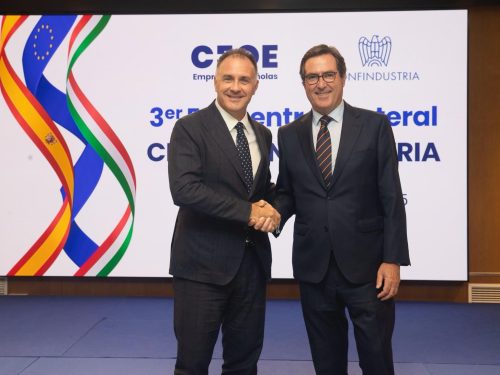News
Share on
Confindustria presented a survey on the state of the art of sustainability in Italy, providing a quantitative analysis of consumers' sentiment towards sustainability at 360° and on the evaluation of the maturity of Italian companies in integrating these topics in their respective realities. Between last October and November, the survey, carried out by Havas Pr and Havas Media Network, involved a sample of 500 respondents representative of the Italian population and 16 entrepreneurs of the Italian industrial panorama.
The study was presented at the main event of the 22nd Confindustria Business Culture Week 'Industry 5.0: the future is here. Awareness and sustainable development' at the MAXXI in Rome. Through the speeches of distinguished speakers, the day devoted special attention to reflecting and sharing experiences on the key issues of sustainability and economic, environmental and social responsibility in their various forms and in different sectors.
The quantitative consumer survey showed that Italians still prefer high-quality products, but price remains a critical determinant: 92% consider quality and 89% cost as the main purchasing factors. Sustainability, with a focus on environmental and social aspects, is relevant for 80% of the respondents, with women and individuals between 55 and 64 years of age paying particular attention. The presence of children accentuates the interest in quality, origin and sustainability of the supply chain.
Despite the positive attitudes declared, only 28% of Italians say they are 'very attentive' to sustainability, while 52% say they are 'fairly attentive' to the issue - associating it mainly with recycling and separate waste collection; 1 in 5 (20%) say they are indifferent or consider sustainability irrelevant. 60% of the respondents say they are not familiar with the acronym ESG.
While individual responsibility is related to the environment and recycling, sustainable companies are judged on both environmental and social issues. 46% of respondents consider worker protection as the main criterion for a sustainable company, followed by respect for equal opportunities (41%).
Young people inform themselves and choose sustainable brands, while 57% of Italians are willing to opt for sustainable products without impacting their wallets, falling to 50% in the 45-54 age group.
For the private sector, the importance of transparent and effective communication emerges. Consumers, in fact, inform themselves mainly through diversified channels, with the official company website in first place (45%). Communication also becomes an employer branding tool, with an equal distribution between genders, ages and different consumer backgrounds.
The qualitative survey conducted through interviews with entrepreneurs showed that Italian companies have been integrating sustainability since their foundation and consider it a long-term solution. Companies are evolving from a 'compliant' approach to one that uses sustainability to differentiate themselves in the market. Employee satisfaction is a priority, with an increasing focus on inclusion and equity. Welfare, skills and the relationship with schools are relevant issues. Technological innovation is key to the green transition, with a focus on the circular economy and the integration of Artificial Intelligence. Sustainability governance and generational transition are challenges, with only 25% of SMEs having a dedicated sustainability figure.
Collaboration between supply chains is a key element. Companies invest in ESG training to support smaller supply chains. Made in Italy, with its hallmarks of quality, creativity and human relations, offers a unique advantage.
The investment priorities denote a clear focus on an integrated approach to sustainability: digital, green and human capital-ESG.
The companies interviewed express the need to review industrial policies - both national and European - with a view to integrating the three aspects of E-S-G sustainability, in order to focus on Made in Italy as an effective lever to enhance the value of our country on markets all over the world, generating wealth and development in the long term.
"Capitalism is evolving and companies are no longer called upon to produce value but values: economic, social and environmental. Business in key 5.0 puts people at the centre and makes it clear that the investment in people is, today, an industrial investment,' said Katia Da Ros, Confindustria Vice President for Environment, Sustainability and Culture. In this context, employer branding is a key factor in communicating one's values and sharing a vision of the future and community, focusing on human resources. Added to this is good sustainability governance, which means first and foremost a corporate organisation capable of accompanying the evolution of production processes. The approach to sustainability,' continued Da Ros, 'can only be integrated, as is clear from the qualitative interviews in the survey: good governance is a prerequisite for good reporting; good reporting for effective employer branding, and the latter for evolving business models in a 5.0 key'.
"All this," emphasised Confindustria Vice-President Da Ros, "translates into investments for companies but, without public policies that support them and are guided by the criterion of technological neutrality, it risks becoming an unsustainable cost and causing the country to lose competitiveness shares. In recent years, with the Green Deal, we have witnessed a Community policy that has approached environmental objectives in an ideological manner, without understanding the risks for the industrial sectors most exposed to international competition, and without realising that industrial development and innovation are the focus of technological solutions to achieve sustainability, environmental, economic and social objectives,' Da Ros added. We need to adapt the timing of the green transition to the timing of industrial transformation to avoid the risk of deindustrialisation in Europe and ensure economic and social sustainability. Innovative investments must be stimulated, as the US and China are doing, to turn the challenge of the green transition into a great opportunity for sustainable development'.
The event "Industry 5.0: the future is here. Awareness and sustainable development" is promoted by Confindustria with the support of Intesa Sanpaolo and IWS, together with the Strategic Main Partner for Enterprise Culture 4.Manager, with the partnership of Audi and in collaboration with Fondimpresa.
Attachments
















